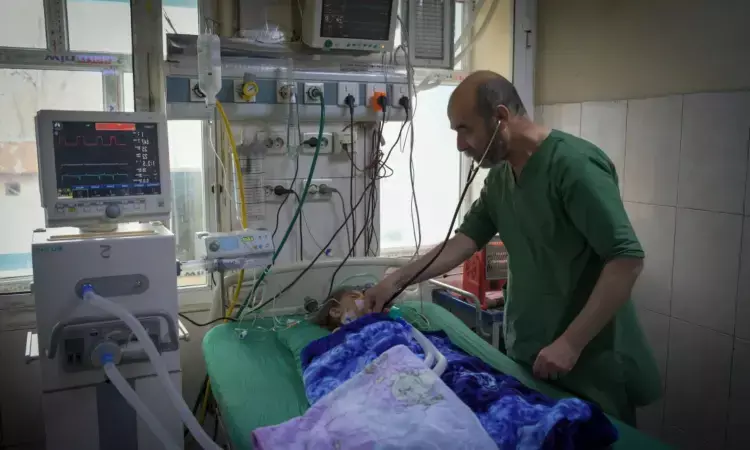- Home
- Medical news & Guidelines
- Anesthesiology
- Cardiology and CTVS
- Critical Care
- Dentistry
- Dermatology
- Diabetes and Endocrinology
- ENT
- Gastroenterology
- Medicine
- Nephrology
- Neurology
- Obstretics-Gynaecology
- Oncology
- Ophthalmology
- Orthopaedics
- Pediatrics-Neonatology
- Psychiatry
- Pulmonology
- Radiology
- Surgery
- Urology
- Laboratory Medicine
- Diet
- Nursing
- Paramedical
- Physiotherapy
- Health news
- Fact Check
- Bone Health Fact Check
- Brain Health Fact Check
- Cancer Related Fact Check
- Child Care Fact Check
- Dental and oral health fact check
- Diabetes and metabolic health fact check
- Diet and Nutrition Fact Check
- Eye and ENT Care Fact Check
- Fitness fact check
- Gut health fact check
- Heart health fact check
- Kidney health fact check
- Medical education fact check
- Men's health fact check
- Respiratory fact check
- Skin and hair care fact check
- Vaccine and Immunization fact check
- Women's health fact check
- AYUSH
- State News
- Andaman and Nicobar Islands
- Andhra Pradesh
- Arunachal Pradesh
- Assam
- Bihar
- Chandigarh
- Chattisgarh
- Dadra and Nagar Haveli
- Daman and Diu
- Delhi
- Goa
- Gujarat
- Haryana
- Himachal Pradesh
- Jammu & Kashmir
- Jharkhand
- Karnataka
- Kerala
- Ladakh
- Lakshadweep
- Madhya Pradesh
- Maharashtra
- Manipur
- Meghalaya
- Mizoram
- Nagaland
- Odisha
- Puducherry
- Punjab
- Rajasthan
- Sikkim
- Tamil Nadu
- Telangana
- Tripura
- Uttar Pradesh
- Uttrakhand
- West Bengal
- Medical Education
- Industry
High SII and Low PNI Linked to Prolonged ICU Stay in Pneumonia Patients with Respiratory Failure: Study

China: A recent study published in the International Journal of General Medicine has explored the prognostic value of the Systemic Immune Inflammation Index (SII) and the Prognostic Nutritional Index (PNI) in predicting prolonged Intensive Care Unit (ICU) stays in patients with pneumonia complicated by respiratory failure.
In patients with pneumonia complicated by respiratory failure, both the SII and PNI were associated with prolonged ICU stays. The study of 3,425 patients found that high SII (OR: 2.115) was a significant factor contributing to longer ICU stays in patients who received blood transfusions, while low PNI (OR: 1.378) was linked to extended ICU stays in those who did not receive transfusions. Additionally, invasive mechanical ventilation strongly predicted prolonged ICU stays in both groups.
The length of intensive care unit stay is a crucial indicator of prognosis in patients with severe pneumonia (SP) complicated by respiratory failure (RF). While blood transfusion can help alleviate tissue hypoxia in ICU patients, its impact on patient outcomes, including prognosis, remains a significant concern. In this context, the study aimed to evaluate how immune-nutritional indices—such as the pan-immune inflammation value (PIV), systemic immune inflammation index (SII), system inflammation response index (SIRI), neutrophil-to-albumin ratio (NAR), and prognostic nutritional index (PNI)—influence the duration of ICU stay in patients treated with and without blood transfusion.
By exploring these indices, Zhijuan Zheng, Intensive Care Unit, Meizhou People’s Hospital, Meizhou, People’s Republic of China, and colleagues sought to understand their role in predicting the length of ICU care and their potential to guide better management strategies for patients in critical condition.
For this purpose, the researchers retrospectively analyzed the medical records of 3,425 patients with pneumonia complicated by respiratory failure. They collected data on various factors, including age, gender, body mass index, smoking and alcohol consumption history, hypertension, diabetes mellitus, lung diseases, invasive mechanical ventilation, blood transfusion, APACHE II score, and laboratory test results. The relationship between these factors and the length of ICU stay was then analyzed to identify key predictors of prolonged ICU hospitalization in these critically ill patients.
The study led to the following findings:
- The average length of ICU stay was 5.32 days. 2,521 patients (73.6%) had a non-prolonged ICU stay (less than 9 days), while 904 patients (26.4%) had a prolonged ICU stay (9 days or more).
- Patients with prolonged ICU stays had higher levels of PIV, SII, and SIRI compared to those with non-prolonged ICU stays, both in patients with and without blood transfusion.
- Multivariate logistic regression analysis revealed that high SII (OR: 2.115) and invasive mechanical ventilation (OR: 10.205) were associated with prolonged ICU stays in patients who received blood transfusions.
- Low PNI (OR: 1.378) and invasive mechanical ventilation (OR: 3.566) were independently associated with prolonged ICU stays in patients without blood transfusion.
The study concluded that high levels of the systemic immune inflammation index and the use of invasive mechanical ventilation were independently associated with prolonged ICU stays in patients who received blood transfusions. Conversely, in patients who did not receive blood transfusions, low levels of the prognostic nutritional index and invasive mechanical ventilation were independently linked to extended ICU stays.
"These findings offer a novel approach for personalized medicine, providing valuable insights to guide ICU management of severe pneumonia complicated by respiratory failure. However, the researchers emphasize the need for further prospective cohort studies to better understand the relationship between these composite indices and patient prognosis in this critical condition," the authors concluded.
Reference:
Zheng Z, Yu M, Peng G, Xiao Y. Systemic Immune Inflammation Index (SII) and Prognostic Nutritional Index (PNI) Associated with Prolonged Intensive Care Unit (ICU) Stay in Patients with Pneumonia Complicated with Respiratory Failure. Int J Gen Med. 2025;18:1765-1776 https://doi.org/10.2147/IJGM.S510659
Dr Kamal Kant Kohli-MBBS, DTCD- a chest specialist with more than 30 years of practice and a flair for writing clinical articles, Dr Kamal Kant Kohli joined Medical Dialogues as a Chief Editor of Medical News. Besides writing articles, as an editor, he proofreads and verifies all the medical content published on Medical Dialogues including those coming from journals, studies,medical conferences,guidelines etc. Email: drkohli@medicaldialogues.in. Contact no. 011-43720751


